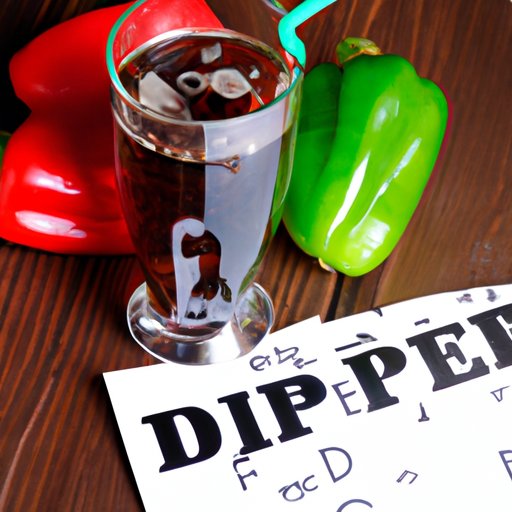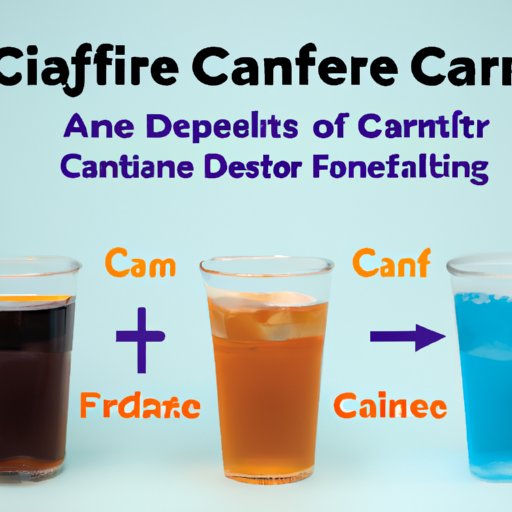
Introduction
For many people, caffeine is an essential part of their daily routine. It provides a much-needed energy boost, helps them stay alert, and improves concentration. While most of us are familiar with caffeine in coffee and tea, the amount of caffeine in other beverages, such as soda, is often overlooked. In this article, we’ll delve into the caffeine content of one popular soda, Diet Dr. Pepper, and explore the recommended safe levels of caffeine intake.
A Brief History of Diet Dr. Pepper
Diet Dr. Pepper was first introduced in 1963 and quickly gained popularity among those watching their weight or with diabetes. It is a low-calorie, artificially sweetened version of the original Dr. Pepper. The beverage has undergone several rebranding and marketing campaigns over the years but continues to be a favorite of those looking for a sugar-free soda option.

The Science Behind Caffeine Content in Sodas
Caffeine is a natural stimulant that affects the central nervous system, improving alertness and concentration. Consuming caffeine can also provide a temporary energy boost and improve physical performance. Soda is a common source of caffeine for many people, particularly those who do not drink coffee or tea. Diet sodas are often preferred over regular sodas for their lower calorie content, making them an appealing choice for those watching their weight.
Caffeine Content in Diet Dr. Pepper Compared to Other Popular Diet Sodas
According to the official website, a 12 oz can of Diet Dr. Pepper contains 41mg of caffeine. This amount is lower than other popular diet sodas on the market, such as Diet Coke, which contains 46mg of caffeine per 12 oz can, and Diet Pepsi, which contains 35mg of caffeine per 12 oz can. However, it’s important to note that caffeine content can vary depending on the brand, flavor, and serving size. For example, a 20 oz bottle of Diet Dr. Pepper contains 68mg of caffeine.
How Much Caffeine Is Safe to Consume per Day
The recommended safe level of caffeine intake varies depending on factors such as age, weight, and individual sensitivity to caffeine. For adults, the FDA recommends consuming no more than 400mg of caffeine per day. This is equivalent to about four 8 oz cups of coffee or 10 cans of Diet Dr. Pepper. However, it’s important to note that excessive caffeine intake can lead to negative side effects such as jitters, increased heart rate, and anxiety.
Potential Side Effects of Overconsumption of Caffeine
In addition to the short-term side effects such as jitters and anxiety, there are potential long-term health effects associated with overconsumption of caffeine. These include increased blood pressure, heart disease, and weakened bones. It’s important to moderate your caffeine intake and be mindful of how much caffeine you consume in a day, especially if you are consuming other sources of caffeine such as coffee and tea.
Insights on the Caffeine Levels in Diet Dr. Pepper for People with Specific Health Conditions
For individuals with heart disease or high blood pressure, it is recommended to moderate caffeine intake. While the caffeine content in Diet Dr. Pepper is relatively low, it’s important to be mindful of other sources of caffeine in your diet. For those with anxiety disorders, it’s generally recommended to limit caffeine intake altogether, as it can worsen symptoms.
Alternative Soda Choices with Lower Caffeine Contents
If you’re looking to reduce your caffeine intake, there are several alternative soda choices available that contain little to no caffeine. These include ginger ale, lemon-lime soda, and fruit-flavored sodas. Additionally, you can try switching to water, herbal teas, or flavored sparkling water to stay hydrated without the caffeine boost.
Conclusion
Caffeine is a staple of modern diets, and for many people, a can of Diet Dr. Pepper is the perfect pick-me-up. While Diet Dr. Pepper contains less caffeine than others, it’s still important to consume it in moderation, especially for those with specific health conditions. There are plenty of alternatives to soda that provide hydration without added caffeine, and it’s important to be mindful of your daily caffeine intake to avoid negative side effects.





